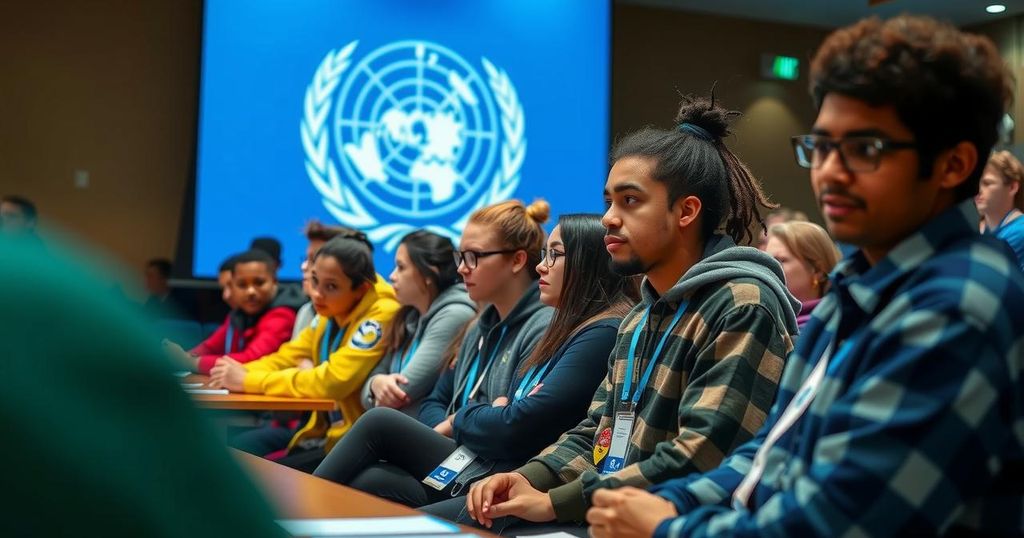At the UN climate talks, young activists confront the emotional toll of climate change while striving for hope and justice. Despite facing significant losses and political uncertainties, they advocate passionately for their futures. Youth leaders like Marinel Ubaldo express frustration over feeling like mere symbols, yet continue to attend summits in the hope of tangible change. Their efforts highlight the critical need for genuine youth engagement in climate negotiations.
At the United Nations climate talks, young activists contend with a profound sense of loss along with their ardent hope for the future. Many youths are grappling with the impacts of climate change that have devastated their communities, caused loss of education, and uprooted their lives in irreparable ways. Despite the emotional toll, they persist in their fight for climate justice, striving to ensure their voices are heard amidst growing global uncertainty regarding climate policies. Marinel Ubaldo from the Philippines reflects on her experiences, stating, “It has become so tiring for me to be just a poster child” for climate advocacy, as she recalls the devastation caused by typhoons in her homeland. Now 27, Ubaldo is preparing to attend her sixth Conference of the Parties (COP). She expresses a mix of pessimism and faint hope that this year’s summit could yield clearer outcomes. The attendance of leaders at the summit has waned, with visible political instabilities in key countries such as the United States and Germany exacerbating this situation. Additionally, young activists face heightened restrictions on their ability to protest due to the authoritarian context of the host country. Felipe Paullier, from the United Nations youth office, acknowledges the struggle for youth representation, indicating that the U.N. is committed to enhancing youth involvement in climate negotiations. Children and youth globally are disproportionately affected by climate change, which can cause severe health issues. UNICEF’s Kitty van der Heijden stated, “We are simply not doing good enough for children in this world. We are failing children.” This assertion underscores the urgent need for a focused response to protect the rights and well-being of younger generations. For many young delegates, participating in the COP has become a reluctant necessity. Fathimath Raaia Shareef from the Maldives articulates the burden they face, saying, “How am I supposed to focus on anything else when my island, when my home country is at risk?” Her vivid depiction of climate anxieties highlights the emotional struggle that many youths endure. Francisco Vera Manzanares from Colombia describes the COP experience as fraught with disillusionment, noting that institutions tasked with climate governance are falling short. He asserts, “People listen to children. But, let’s say, it’s different (to) listen than hear,” emphasizing the critical need for genuine engagement from adults in fostering youth advocacy in these discussions. As the stakes escalate with each COP, these young climate advocates remain undeterred in their quest for meaningful change, urging their peers and leaders to recognize that this is not merely about future generations but about their present rights and realities.
The increasing impacts of climate change are becoming increasingly evident, particularly affecting vulnerable populations, including children and young people. Climate talks such as the COP are critical platforms where significant world leaders convene to negotiate climate policies that shape the future. However, young activists often feel marginalized in these discussions, even as they bear the brunt of climate-related disasters. Their emotional and psychological battles are fueled by losing homes, education, and family connections due to climate change, prompting them to seek out channels for empowerment and advocacy at global summits.
Young climate activists are navigating a complex emotional landscape marked by a blend of anger and hope, as they persist in advocating for their futures amid the ongoing climate crisis. With diminished political action and increasing hardships stemming from climate change, their pursuit of justice becomes more urgent. Yet, they maintain their resolve to engage meaningfully with decision-makers, emphasizing that their voices and rights must be prioritized in global climate discussions, as they have the most to lose and the most to save in this ongoing battle.
Original Source: www.detroitnews.com







